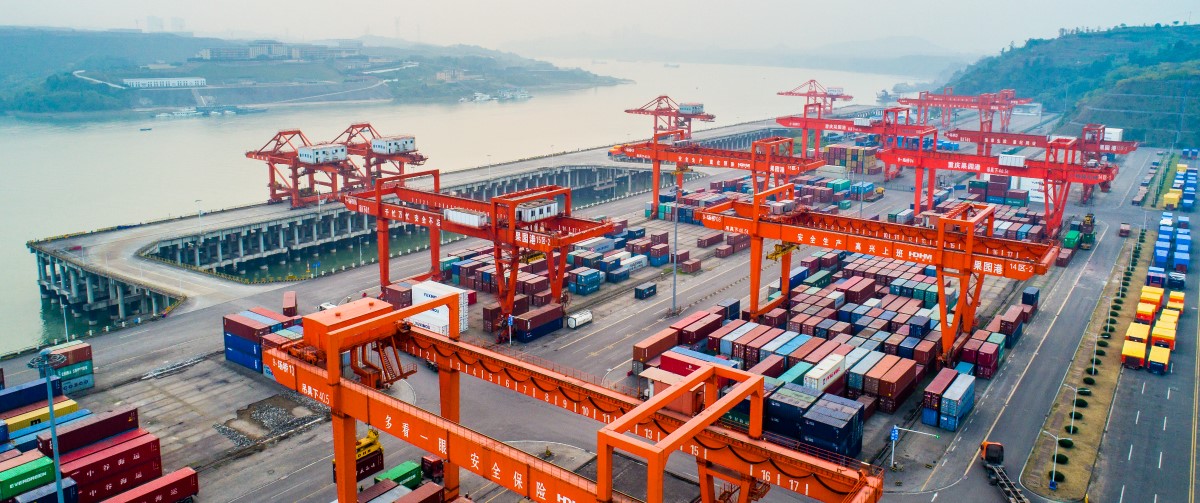May. 10, 2022

A view of the Qinzhou port in Guangxi Zhuang autonomous region, on Oct 27, 2021. [Photo/Xinhua]
China will ensure smooth logistics and production activities, and reinforce regional economic cooperation to support its foreign trade and ease pressure on its exporters, as the impact of the recent domestic COVID-19 resurgence may last for a while, said government officials and analysts.
Despite the country's foreign trade achieving stable performance in the first four months of the year, they said more efforts are needed, as the export sector faces multiple challenges and risks, such as a high base from last year, and some internal and external factors, including the Russia-Ukraine conflict.
The total value of China's foreign trade rose by 7.9 percent on a yearly basis to 12.58 trillion yuan ($1.88 trillion) between January and April, with exports increasing 10.3 percent from the same period last year to 6.97 trillion yuan and imports growing 5 percent to 5.61 trillion yuan, the General Administration of Customs said on Monday.
The country's exports grew 1.9 percent year-on-year to 1.74 trillion yuan in April, while its imports dropped 2 percent to 1.41 trillion yuan, according to Customs data.
"The drop in imports in April was caused by the COVID-19 resurgence in China's Yangtze River Delta region, as this has lengthened the process of customs clearance and logistics," said Ma Yu, a researcher at the Chinese Academy of International Trade and Economic Cooperation in Beijing.
Apart from facing fierce competition in Southeast Asian countries in the area of labor-intensive manufacturing sectors to date this year, the flow of goods of China's exports at Shanghai's ports, which has been limited by strict epidemic prevention measures, slowed last month, he said.
Faced with a more complex and severe external environment, Li Kuiwen, director of the administration's statistics and analysis department, reiterated that the fundamentals of China's long-term sound economic growth will not change.
"China's goal of maintaining stability and improving foreign trade throughout the year is still well supported," he said, adding that closer regional economic cooperation and continuous optimization of the trade layout will further boost China's exports and imports with other signatories of the Regional Comprehensive Economic Partnership and economies related to the Belt and Road Initiative.
Experts said it is urgent for the government to speed up the work resumption in the Yangtze River Delta region and introduce policies to further lower the prices of commodities to ease the pressure on Chinese exporters.
Given challenges in the foreign trade sector, Sheng Qiuping, vice-minister of commerce, said the government will help export-oriented companies gain more orders through both online and offline channels, and further increase credit support to them, especially the small, medium and micro enterprises.
"We will accelerate the growth of new forms of foreign trade such as cross-border e-commerce and other businesses, establish a national negative list for cross-border trade in services, and foster new growth areas for trade in services," he said in a recent interview.
The government will uphold the leading role of major foreign trade firms and speed up its cultivation of "little giants", or innovative small and medium-sized enterprises that have played a crucial role in consolidating the country's supply and industrial chains, said Sheng.
Through policy assistance, the ministry began to work with China Export and Credit Insurance Corp in late February to give full play to the role of export credit insurance in risk prevention and credit enhancement.
By stepping up the use of export credit insurance, the ministry will protect exporters from the risk of nonpayment by foreign buyers, and improve foreign trade companies' risk-hedging capabilities amid fluctuations in the renminbi-US dollar exchange rate, as part of efforts to stabilize market entities and spur foreign trade growth.
Even though it has 144 orders, mainly for container and bulk vessels, Mao Jian, deputy head of material supply department at a shipbuilding firm in Jingjiang, Jiangsu province, said the company is facing pressure in obtaining supplies of marine paint, as many related manufacturers in Zhejiang and Jiangsu provinces have difficulties in resuming production at full capacity.
Sections for nearly 20 ships still need to be painted, and the issue of getting sufficient marine paint and other industrial parts has delayed production in recent months, he said, pointing out that this will affect the company's schedules for launching new ships and their delivery to foreign customers.
Previous: The 260,000 TEU cargo in Shanghai Port will surge in!
Next: None
